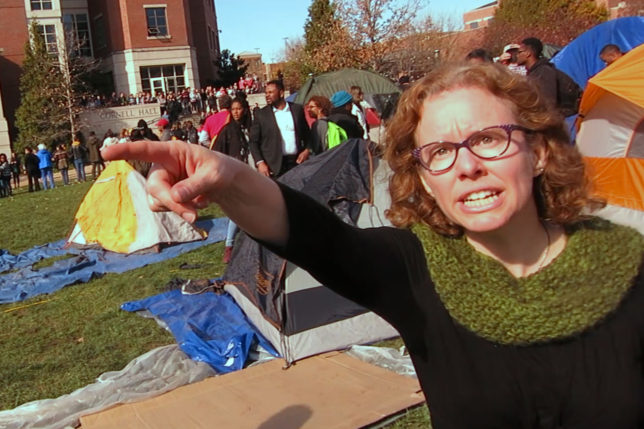Deception & Misdirection
The Battle for America’s Unconscious Mind: The Frankfurt School
The psychology behind the Left’s cultural long march


The Battle for America’s Unconscious Mind (full series)
The Language Game | The Frankfurt School | Framing the Debate | Appealing to the Heart
Summary: For all the talk of “unconscious bias” that the Left uses to cow their intellectual opponents, left-wing activists are not afraid to use subtly loaded language to win arguments and silence dissent. A look at the history of cultural Marxism and the evolution of public policy debates shows that conservatives need to apply more finesse to language and consider emotive strategies to bolster already superior arguments.
Education was a primary target of the long march strategy. If students could be simply immersed in the leftist worldview with the enforced absence of contradictory perspectives, they would, over time, take those ideas with them into the other institutions of society and the Left’s revolution would succeed without a shot being fired.
By the 1960s, the central ideas of the leftist worldview had established a beachhead in American education. One scholar of the Frankfurt School who taught at Columbia, Brandeis, Harvard, and the University of California at San Diego was Herbert Marcuse.
As Michael Walsh describes in his book on the Frankfurt School, The Devil’s Pleasure Palace: The Cult of Critical Theory and the Subversion of the West, Marcuse was very popular among student radicals in the 1960s and provided intellectual support for the Left’s counter-cultural movement of that era. Blending Marxist theory with Freudian psychoanalysis, he argued that Judeo-Christian culture repressed perfectly natural sexual urges and that true liberation required freeing society from those restraints. Those ideas helped to fuel the notions that “if it feels good, do it” and “make love, not war” that became popular slogans of campus leftists. On the economic front, Marcuse argued that the competitive pressures of the free enterprise system were another form of repression and that eliminating that system would be a major achievement for civilization.
Marcuse also laid the intellectual groundwork for the Left’s repression of opposing speech in his classic 1965 treatise, Repressive Tolerance. The essential argument states that, because the existing system is intolerant by the Left’s standards, true tolerance requires suppression of ideas and movements on the Right and acceptance only of those on the Left.
From its strategic position in the ivory tower, the “long march” moved out into every other cultural institution that shaped the political thoughts and feelings of America. News outlets did less true reporting and more advocating for the leftist agenda. Entertainment began to push the moral worldview of the Left and to undermine and even ridicule traditional values. Seminaries and pulpits of the “mainstream” churches reflected the shift in worldviews and began to provide religious air cover for the Left’s long march.
What’s in a Word?
Notice how subtle differences in the language we use to talk about political issues are actually grounded in the very different assumptions about the role of government as described above. Take the simple word “gridlock,” frequently used by the Left to describe situations in which House, Senate, and President do not reach agreement to take some action. The association with traffic jams invests “gridlock” with the negative connotation that something that should flow smoothly has somehow become blocked. Note the unspoken assumption that the role of government should be that of activist and that failure to act is a problem.
People hearing the news that government is “gridlocked” over an issue might never consciously realize how much that single word is packed with meaning that subtly frames the situation in a negative light. It might never occur to them that our system is designed to require broad agreement across branches before government can act, or that the intention of that design is to protect people from having their rights violated by a small but powerful group pushing a particular agenda. But they have been subtly influenced to see something as a failure that could easily be seen as a success.
The idea of “gridlock” is just one example. How about our reaction to words or phrases such as “tax cuts,” “income inequality,” “hate speech,” “diversity,” and other current topics? Let us look now at how cognitive science has demonstrated just how much meaning can be packed into a simple word or phrase, and how a slight shift dramatically alters the reaction. After a short overview of relevant findings, we will then look at how those findings play out in the battle for our culture and our political future.
Let’s start with a simple word that has no political baggage. When you hear the word bird, your brain triggers a network of associations that can be represented like this:
It is not necessary for you to consciously think of flying, wings, or the other associations, but they are there in your mental reaction to the word bird, and they have two effects. First, those associations form your understanding of what the object is. Second, your brain quickly evaluates new things as either potentially positive things or as potentially negative, threatening things. If you are like most people, you would have a slight positive reaction to the word bird. If the word had been “spider” or “snake,” you would have had a different set of associations that carried a more negative cast.
In the same way, political words and phrases trigger a network of associations and emotional evaluations that do not necessarily come to the surface of conscious awareness, but which nevertheless shape our reaction in a positive or negative direction. Consider the reaction to the phrase “limited government under a Constitution.” Let us look at the reaction of two people, one a traditional conservative and the other someone fully immersed in the leftist worldview.
Someone grounded in the conservative worldview described above would have a network of associations that might look something like this:
Note that conservative ideas about human nature and the source of our rights are all triggered by the phrase “limited government under a Constitution” and form a kind of mental structure that supports the idea of limited government. Even images from history, with the horrible abuses of power under fascist and communist regimes, could be part of that architecture. As was the case with the word “bird,” the brain makes all these associations without conscious reflection, but it shapes our instantaneous understanding of what the word means.
And here are two critical points: A person with a network of associations such as that in Figure 2 would experience the idea of limited government in a positive light without necessarily having to think about the underlying reasons. And let us note explicitly that the abstract principle of “limited government under a Constitution” is grounded in a deep moral desire to prevent abuse of power and to protect innocent people from harm.
But what if the person hearing that same phrase has been immersed in the Left’s worldview through public schooling and other cultural institutions? Their network of associations might look something like that in Figure 3:
The idea of “limited government under a Constitution” is on shaky ground when it rests on a mental structure like that in Figure 3. In the Left’s view, that idea is an antiquated holdover of an earlier and less “woke” era promoted by white males to preserve their privileged positions of social and economic power. Because the Left views the proper role of government as that of activist, seeking out and eliminating inequality wherever it is found, the Constitution’s limits on governmental power represent to the Left an actual barrier to true progress towards economic and social equality. And once again, note that, at least within this set of associations, innocent people are actually harmed by the limits imposed by our Constitution.
The growing influence of that perspective is direct evidence of the success of the Left’s long march through our educational and other cultural institutions. The implications are even more stunning when we realize that any word or phrase having to do with role of government—”tax cuts,” “border security,” “law and order”—would run into that deep set of associations.
Of course, there will be people in the middle with elements of each worldview. But at its core, the political struggle for our future is not just between policies but between the fundamental differences in worldview of left and right and in our competing understanding of right and wrong.
That is why, from a strategic perspective, conservatives cannot continue to surrender America’s cultural institutions to the Left. Future voters immersed in the leftist worldview in every major cultural institution will not only fail to defend liberty, they will gladly surrender it and think they have made the world a better place.
The nature of such a strategic cultural struggle is beyond the scope of this article, but right-of-center activists can apply some simple concepts to improve their tactical success in communication. And from a tactical perspective, remember that the Left is working to change our moral and political language to reflect their worldview. Those on the right cannot win the argument if they allow the Left to control the language.
Let us look at the power of framing and the need to be very deliberate in our choice of words.
In the next installment of the Linguistic Battle for America, learn about the power of framing.






